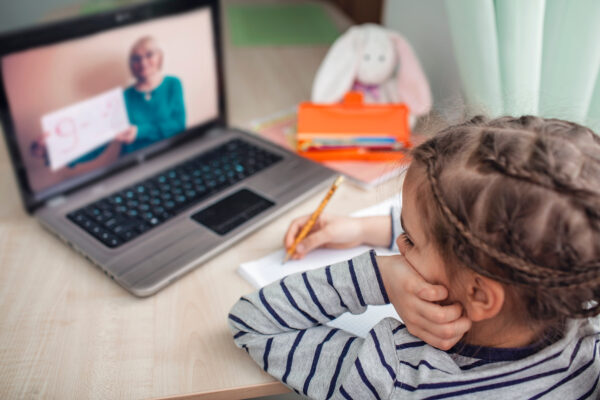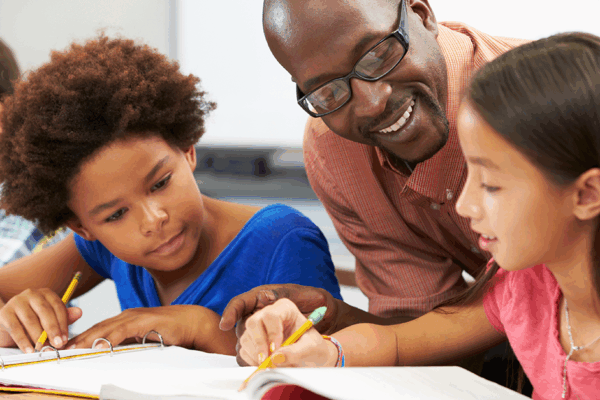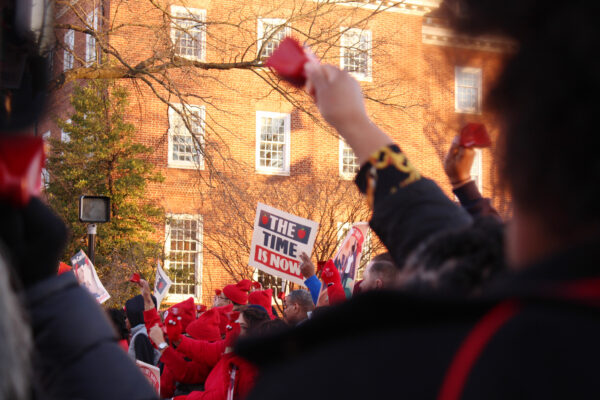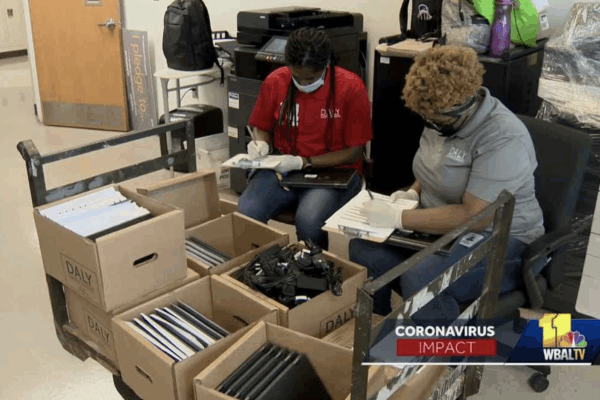During these unprecedented times, we have endured a quarantine and reshaped how our jobs and school systems operate. You might be wondering how this is all affecting your child, especially their education. While many parents and guardians have had to transform into teachers during this quarantine, Kyla-Marie James, an 11th grader at Mergenthaler Vocational Technical School, describes the new responsibilities that students have had to take on and the struggles she sees other children facing as schools closed out the year remotely because of the COVID-19 pandemic.
“Through a program that I’m in called Wide Angle Youth Media, they provided me with a MacBook,” said Kyla-Marie. “My siblings don’t have electronics though, so I have had to share. I know a couple of friends that don’t have laptops, so they have to use their phones, which I think is harder to do school work on.”
Baltimore City Public Schools reported that around 45% of students do not have computers and/or internet access for remote learning.
For around half of the children in Baltimore City, remote learning poses many difficulties, especially with the lack of basic equipment at home, such as laptops or internet access. Baltimore City Public Schools reported that around 45% of students do not have computers and/or internet access for remote learning.
Baltimore City leaders and BCPSS collaborated to address the gaps in technology, purchasing over 12,000 computers and setting up internet hotspots for children in need of this service and technology. There are also many organizations that are looking to give children opportunities to be successful during remote learning, despite some of them not having the tools necessary at home.
Elev8 Baltimore is an after-school, community school, and youth and parent development program in Baltimore, ran by Alex Warrick Adams who raised almost $11,000 to create a hotspot internet hub in her own building. It grants free internet access to families in need of it.
“The community has stepped up to support children in Baltimore City and now it’s the state lawmakers’ turn,” said Frank Patinella, senior education advocate for the ACLU of Maryland. “Children are struggling due to the negligence of our state decision makers. City students are guaranteed sufficient education funding and resources under the state constitution.”
BCPSS is mostly attended by Black students and children from families with low income.1 The great divide in educational opportunities between districts of low wealth and high wealth and between students of color and their white counterparts is getting worse. COVID-19 only exacerbated the inequities that exist for children in Baltimore City, exposing how state underfunding has made the city’s lag behind in this digital age even worse when education went remote.
To reduce the enormous racial disparities in Maryland schools, focused, intentional investments must be made towards Black and Brown children in Baltimore City. We are also calling on legislators to make critical changes to ensure that districts already struggling from decades of underfunding and that are furthest from funding equity and adequacy are given the highest priority.
As a community, finding ways to support children and provide the tools necessary for them to succeed academically during the remote learning period, which may go on even through next school year, is the State’s constitutional duty.
“All schools should give students laptops,” said Kyla-Marie. “They loaned me this laptop and my brothers haven’t gotten laptops. That’s unacceptable.”
By the state’s own study, Maryland schools are being shortchanged by at least $1.5 billion annually and Baltimore City and Prince George’s County, districts with the most Black and Brown people, have the greatest loss in funding. Cuts by the State of Maryland to “Thornton” education funding over the last decade have fundamentally impacted Black and Brown children’s education more, worsening racial inequity and school funding for another generation of students.
We are urgently calling on the state to uphold the right to an adequate education for Black children whose schools have been historically underfunded, especially during a time of remote learning, when students need to be caught up in the digital world. Together, we can better prepare schools for this heightened digital age, a necessary step that we owe children in Baltimore City now more than ever.
To recap this unusual school year, ACLU of Maryland NAACP Legal Defense and Educational Fund, Inc., Baltimore Algebra Project, Baltimore Teachers Union, and Arts Every Day hosted a virtual Bradford townhall to examine the ways COVID-19 impacts students and families, the status of the Blueprint for Maryland’s Future legislation, and the historic lawsuit to fix generational disinvestment in Baltimore. Click here to listen.
1 “City Schools at a Glance.” District Overview | Baltimore City Public Schools, www.baltimorecityschools.org/district-overview.




